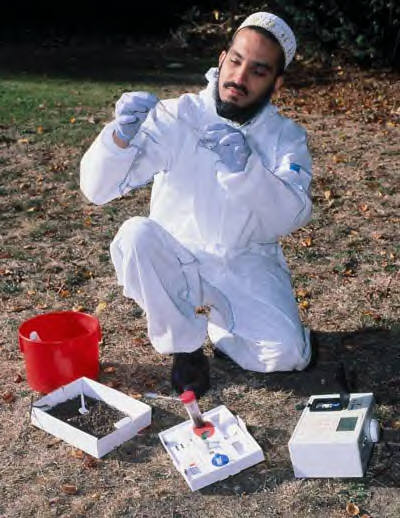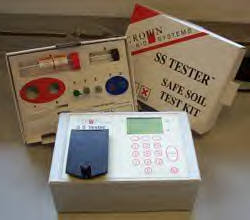
An innovative instrument for on-site soil testing has been developed by a commercial partnership between a University of Greenwich team (led by NRI's Prof. Ray Coker) and the Kent-based innovative SME Crown Bio Systems (CBS), together with an instrument-design company and specialist consultants. The successful venture was supported by funding of about £1 million from the UK Department of Trade and Industry under EUREKA, a European programme for development and marketing of equipment (see www.eureka.be). The instrument is now being field-tested by collaborators in the UK and Ireland.
The new Safe Soil Testerâ„¢ has been designed to provide rapid screening of soil samples from brownfield sites, for the detection and mapping of contaminants such as pesticides or pollutants from manufacturing processes (especially PAHs). Prof. Coker describes the use of the portable, hand-held Tester as "a cost-effective, on-the-spot, rapid screening test" and notes that it "is a vast improvement on current time-consuming and expensive chemical procedures." He adds that "It is about seven times cheaper and can be readily used by those unskilled in chemical analysis."
The evaluation of brownfield sites for pollutants and contaminants is of growing commercial importance. For example, as Prof. Coker has remarked "It is estimated that 3.8 million new homes will be required in the UK by 2016, and to reduce further encroachment into rural areas the Government is encouraging the use of brownfield sites." The rapid screening provided by the Safe Soil Testerâ„¢ has obvious application in assessing whether a brownfield site is suitable for housing development or whether remediation will be required.

The Safe Soil Testerâ„¢.
© University of Greenwich
The market for this technology is being driven by legislation in Europe, USA and Japan, where notification of contaminated land, clean-up and certification is now being enforced and where the numbers of suspected contaminated sites are estimated to run into millions. CBS is currently promoting awareness of the uses of the Safe Soil Testerâ„¢ for real-time assessment and monitoring of land, and is in discussion with multinational companies based in Germany and Japan for the sale of licences or the negotiation of royalty agreements. The University of Greenwich is a beneficiary of the exploitation of the IPR.
The importance of NRI's capabilities in detection of toxins for the success of the EUREKA project have been acknowledged by the Managing Director of CBS, who said "The University of Greenwich has the specialist facilities required for the handling of toxic compounds and the ability to put together a first-rate multidisciplinary team." NRI's specialized toxic hazards suite is central to such work, and CBS is now planning further commercial ventures with NRI focused on our skills and facilities in toxin detection.
For more information about the Safe Soil Testerâ„¢, visit the Crown Bio Systems website.

